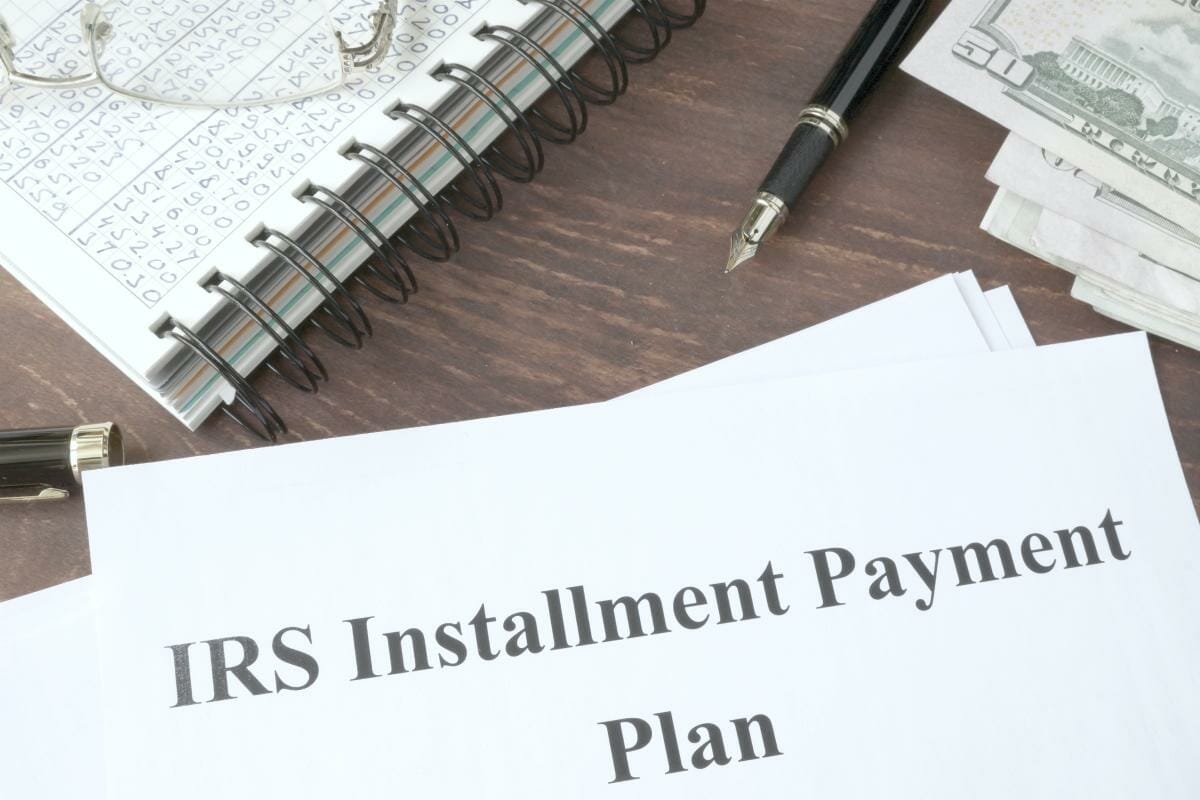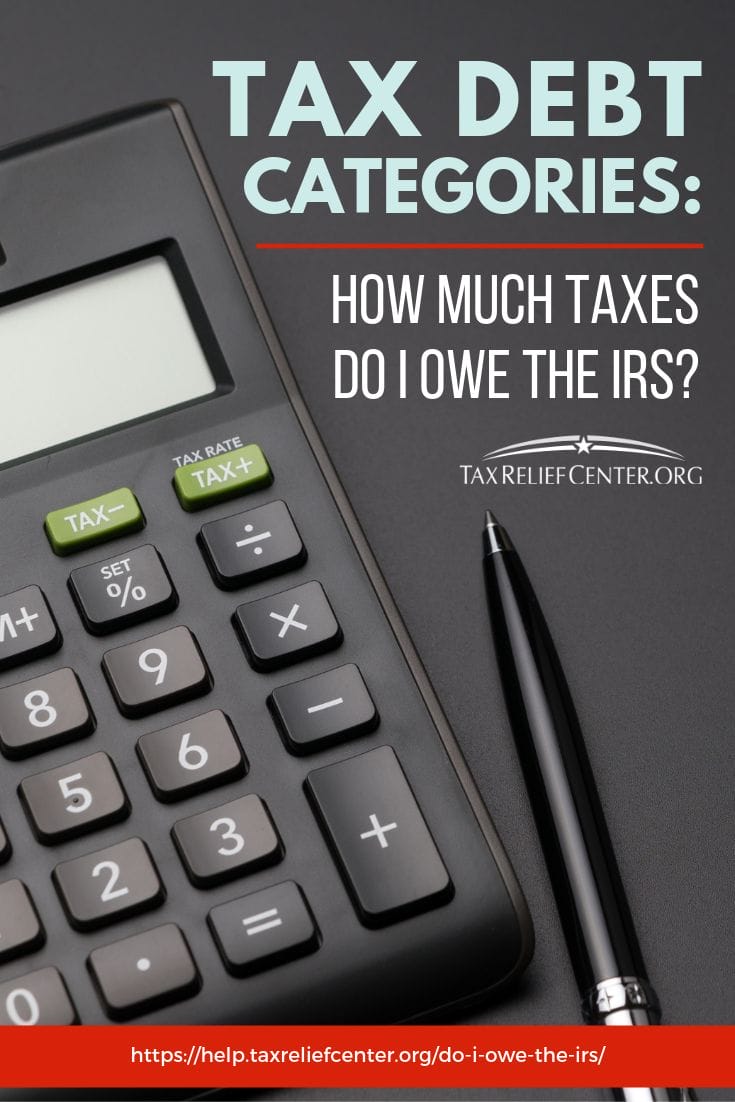The question “Do I owe the IRS?” creeps up in the mind of every taxpayer from time to time, so the Tax Relief Center answers important questions surrounding due taxes, late payments, and tax penalties.
RELATED: What Is The Penalty For Filing Taxes Late
In this article:
- How Much Do I Owe the IRS?
- When Do I Have to Pay the IRS By?
- How Much Can I Owe the IRS Without Penalty?
- What Happens If I Owe the IRS a Large Sum of Money?
- What Do I Do If I Owe the IRS and Can’t Pay?
- Why Do I Owe Taxes with No Exemptions?
- Why Do I Owe the IRS So Much This Year?
- Can I Do My Taxes If I Owe the IRS?
- If I Owe the IRS Do I Get a Refund?
- Do I Owe the IRS for Student Loans?
Do I Owe the IRS? Straight Answers to Relevant Questions
How Much Do I Owe the IRS?
You can gain a reasonable estimate of your back taxes by looking at your taxable income and measuring it against the tax brackets while taking stock of your revenues, capital gains, and property sales for the year. It also pays to research the kinds of taxes we pay in the US.
For a more accurate answer to the “Do I owe the IRS” question, you can now check any of your back taxes through the following:
- IRS Account Online: You will need to log in or create an account to view any outstanding taxes and tax penalties.
- IRS Hotline: Individual taxpayers can reach the IRS and find out their due taxes by calling 1-800-829-1040 while business owners and representatives can call 1-800-829-4933. The IRS operates those lines from 7 am to 7 pm on weekdays only.
- By Post: The IRS will mail a letter or a notice to your registered address to notify you of pending taxes. An IRS collection notice or letter presents the least current information on your due taxes so it’s better if you can call or check online for the exact amounts you owe.
When Do I Have to Pay the IRS By?
Every taxpayer must file their tax returns and pay their due taxes for the previous year on or before April 15.
A taxpayer will incur tax penalties if they miss paying by this deadline. The IRS will take half of 1% of the total amount of tax you owe and apply it every month until it caps at 25% of your outstanding tax debt.
For example, a taxpayer owes the IRS $2,000 in back taxes in 2017. The IRS will levy a .5% late payment penalty amounting to $10, since $20 is 1% of $2,000.
If the taxpayer leaves the tax unpaid until June 2019, which is 25 months from the time the tax amount became due, he will have to shell out $250 more on top of $2,000 he owes. The penalty interest can swell up to a maximum of $500 since it is 25% of the tax he owes.
This computation does not include the penalty interest on the outstanding tax.
How Much Can I Owe the IRS Without Penalty?
It’s 10% of the taxes you’re supposed to pay. You will need to file an extension to file your tax return and you should have at least paid for around 90% of the taxes you owe.
The 10% balance becomes due once the extension period is up.
For 2019, the IRS lowered the cap to 80% because of the changes the Tax Cuts and Jobs Act of 2017 brought. This means if you owe the IRS around 20% of the total amount of taxes due, they didn’t apply any penalties for this year alone.
RELATED: Tax Penalty For Underpayment [2019 Edition]
What Happens If I Owe the IRS a Large Sum of Money?
The IRS categorizes tax debtors into categories starting at $10,000 and below, $50,000 and below, and $100,000 and below. Here’s what a taxpayer can expect the IRS will do if their tax debt accumulates within any of those ranges:
- $10,000 and Below: The IRS practice leniency by not placing a tax lien on your property provided you don’t ignore their notices or letters. You automatically qualify for their guaranteed installment agreement that allows you to pay your tax debt within 3 years.
- $50,000 and Below: When a taxpayer enters this tax debt range, the likelihood of the IRS placing a lien on their properties increases. The IRS will offer these taxpayers a streamlined installment agreement which allows them to keep their financial information private as long as they keep up with the payments.
- People who owe the IRS between $25,000 and $50,000 will have to set up a direct debit payment plan with the IRS. Taxpayers in this debt category must pay their tax debt within 3 years or ask the IRS to provide an extension. This will involve filing a Form 433 and sharing detailed financial information with the IRS.
- $100,000 and Below: The IRS places tax liens on the properties of taxpayers in this debt range. They can also sell off the properties of these debtors through tax levies.
- The government will cancel the passports of these taxpayers to keep them within the country until they settle their tax debt. Taxpayers in this category who are traveling overseas can return to the US and remain there until they pay off their entire tax obligation.
- Taxpayers carrying this much tax debt will have to share detailed information about their financial situation to qualify for any arrangements with the IRS.
Tax Levy Definition: The process where the IRS sells off the properties of delinquent taxpayers to pay off their tax debts
What Do I Do If I Owe the IRS and Can’t Pay?
You possess the following options if you don’t have the capacity to pay your back taxes at this moment:
- Pay in Installments: You can talk to the IRS about paying your taxes in increments within a short-term period of 120 days or a long-term period of more than 120 days. The IRS will charge applicable fees if you choose this option, so take this into consideration in case you’re monitoring your budget.
- Go for an Offer in Compromise (OIC): Taxpayers facing a heavy tax burden can opt to pay lesser than what they owe through an Offer in Compromise. You’ll need to file all your missing tax returns and not be in bankruptcy proceedings to qualify.
- Ask for an Extension Period: The IRS can give you an extension after you provide them information on your financial situation. They can still place tax penalties for your back taxes.
Why Do I Owe Taxes with No Exemptions?
President Trump’s Tax Cuts and Jobs Act reduced tax rates in all the tax brackets and increased standard deductions to encourage taxpayers to move away from itemized calculations of their returns. The tax reform law’s adjustments involved reducing or eliminating personal exemptions.
This could be why you’re seeing a change in your taxes this year.
Why Do I Owe the IRS So Much This Year?
If there’s a huge difference between the taxes you paid in 2018 with what you paid for or need to pay in 2019, it’s safe to assume that it’s tied to the Tax Cuts and Jobs Act of 2017. A tax specialist will enlighten you on how the tax reform law affected the amount of taxes you owe and the next steps you can do to pay and adjust moving forward.
Can I Do My Taxes If I Owe the IRS?
The IRS advises taxpayers to file any of their missing tax returns all the time. If you’re unsure of how to proceed, you should rely on the help of a tax specialist to do your taxes and come up with a strategy to pay your back taxes.
If I Owe the IRS Do I Get a Refund?
The IRS can take your tax refund and use it or a portion of it to pay your back taxes, and give you the remaining amount through the method you’ve specified. If your tax debt outsizes your tax refund, the IRS will collect the balance from you.
Asking yourself the question “Do I owe the IRS?” implies conscientiousness on your part as a taxpayer and as a citizen. You should apply this mindfulness of your duty to pay taxes by proactively finding out your tax dues and settling them so you only have peace of mind come January or February of next year.
Do I Owe the IRS for Student Loans?
If you’ve defaulted on your student loan payments, the Department of Education will refer your loan for collection to the Department of Treasury. This authorizes the IRS to place a tax offset on your tax refund until your loan has been paid off.
In case you and your partner file jointly, the IRS can also withhold your spouse’s tax refund unless they file an Injured Spouse Claim.
Your best course of action involves talking to a student debt relief specialist, work out a repayment plan with the loan company, or find a way to pay back the debt in full.
What other concerns do you have about tax penalties and interests? Give us your answers in the comments section below and we’ll answer them in succeeding articles.
If you owe back taxes, visit taxreliefcenter.org for more information on tax relief options.
Up Next:
- What Is An IRS Backup Withholding Notice And How To Deal With It
- The IRS Fresh Start Program | How Does It Work? [INFOGRAPHIC]
- A Guide To Estimated Taxes For Small Business Owners




